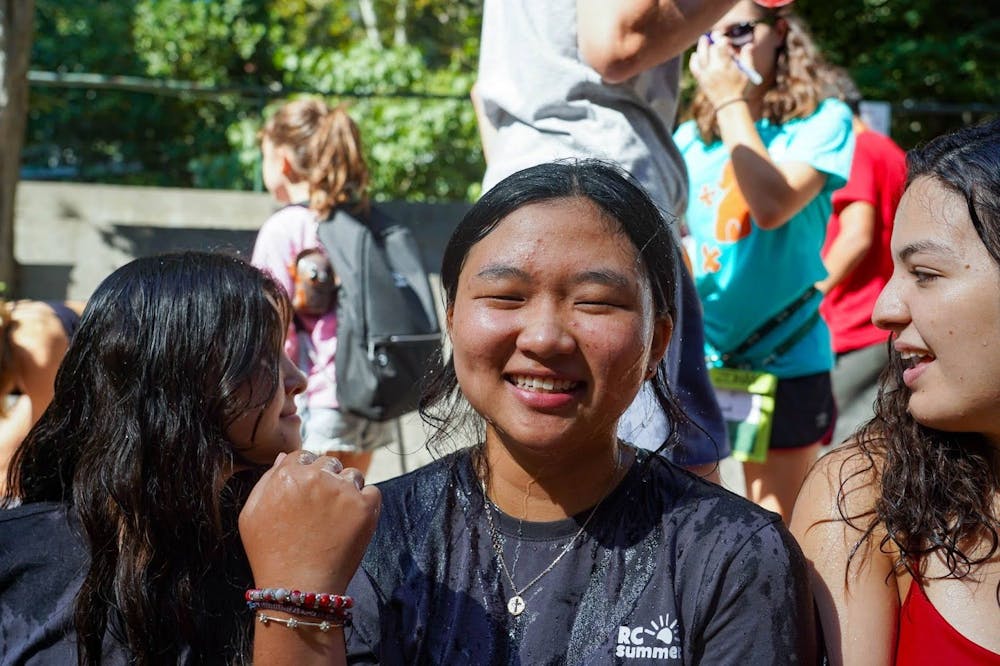I was halfway through Paulo Coelho's The Alchemist when the Black Sea appeared outside my plane window. The hills of Istanbul soon joined the view of the soft silhouette of the morning sun. Knowing the plane was approaching its destination, I decided to stow the tray table and put away the book. I smiled when I thought of how the young shepherd boy in The Alchemist was robbed of all the money he had on him right after he landed in Africa for his great adventure. It was probably a bad sign for me. But like the shepherd boy, I found it too late to turn back.
Flying from Shanghai, the ancient city of Istanbul felt to me just as how Africa felt to the Spanish shepherd boy: distant, thrilling, foreign. I was here as a counselor for a one-month children’s summer camp hosted by an Istanbul American high school. I got picked up from the airport by the program, and the first few days went by like a blur: I overcame jetlag, got a new SIM card, met the other 39 counselors, did the program orientation, met the 298 children we had in this camp and before I knew it, it was the end of the first week of the camp. Every day’s schedule was packed and I was making new friends every hour, but being alone in a foreign land let homesickness kick in.
I was starving when the kids finally went home by the end of the first Friday. Managing nine children of an average age of eight was harder than I had thought. A Turkish counselor brought me the good news that they were ordering special food to celebrate our survival of the first week: something called “manti,” a very traditional Turkish cuisine.

COURTESY OF SARAH HUANG
Manti, served with yogurt and chili sauce.
Expecting something exotic, I was more than confused when the Turkish counselor handed me a bowl of mini dumplings. I asked whether they were dumplings, like the traditional Chinese food, but the Turkish counselor looked just as confused. I was close friends with a counselor from Kazakhstan and another from Russia, who both objected that dumplings were their traditional dish, too.
We eventually decided to let Wikipedia be the judge and found out that dumplings were, indeed, from China, and the very reason they were called “manti” in Turkish was likely because of the pronunciation of a similar dish, “mantou,” in Chinese. The dish was brought to Turkey by the Mongols seven centuries ago.
It is hard to describe the exact feelings I had at the time, but the city suddenly felt less foreign to me, and I started to find more traces of home: tea (which is called çay in Turkish and cha in Chinese), menemen (also a popular dish in China), rice (needless to say), etc. Although I had never set foot in this country before, my culture had. That gave me comfort. It made me feel welcomed. Looking at the moon glowing gently in the sky that night, I imagined how my ancestors met with theirs seven centuries ago, exchanging their favorite recipes.
I told this story in my class “Coffee, Tea and Empires” this semester when we were discussing the interconnectedness of the Eurasia continent prior to the Industrial Revolution — commodities like tea traveled from Southern China to Constantinople; religions from the Middle East flourished in Western China. The main takeaway from the class is that we humans are much more connected than we think.
We are much more connected than we think.That reminded me of the young shepherd boy in The Alchemist. His dream was to travel to the ends of the earth, and he did. Countless other people shared the same dream but failed to do so: His father buried this dream by convincing himself that his hometown was better than all places; a shopkeeper he met on the way dreamed of going to Mecca but did not dare to leave his current life of stability. The reason the shepherd boy managed to fulfill his dream, out of so many who failed, was that he understood the “language of the world.” The stories of everything in the universe are all written by the same hand, and all are connected.
My journey in Istanbul showed me that although humans may not share the same language, we can understand each other’s stories. My ancestors' recipes traveled from the Yangtze Plain to the Bosphorus Strait on the Silk Road; religious stories from Jerusalem to the capital of the Tang Dynasty. This wove together the story of humankind, of how we managed to understand one another and learn from one another centuries ago despite linguistic and geographical barriers.
Our stories continue to connect us as humans. The experience I had with other international counselors in this camp was like no other: I met a goth, lesbian Turkish counselor whose parents were strict conservative Muslims, but, according to her, she was her dad's secret favorite. I met another counselor whose parents migrated to the US from Iraq when she was five. She grew up in Philadelphia but is considering moving back to the Middle East because she feels, as a Muslim, that is where she truly belongs. I met a Filipino salsa dance teacher, a self-acclaimed prince of Pakistan and an Indian Bollywood dancer who rocked the whole camp.

COURTESY OF SARAH HUANG
Huang travelled through Istanbul with other counselors on weekends.
All of those stories fascinated me, just like the diverse, historic, vibrant city of Istanbul did. In a world so deeply divided as the one we are living in, it is easy to forget that history is composed of extraordinary individuals who each have their own stories to tell and that we humans have the ability to make connections through our stories no matter what.
"Wherever I go, people understand me. They understand my soul. This continues to give me hope."
— Paulo Coelho, The Alchemist
Sarah Huang is a sophomore from Shanghai, China majoring in International Studies.





